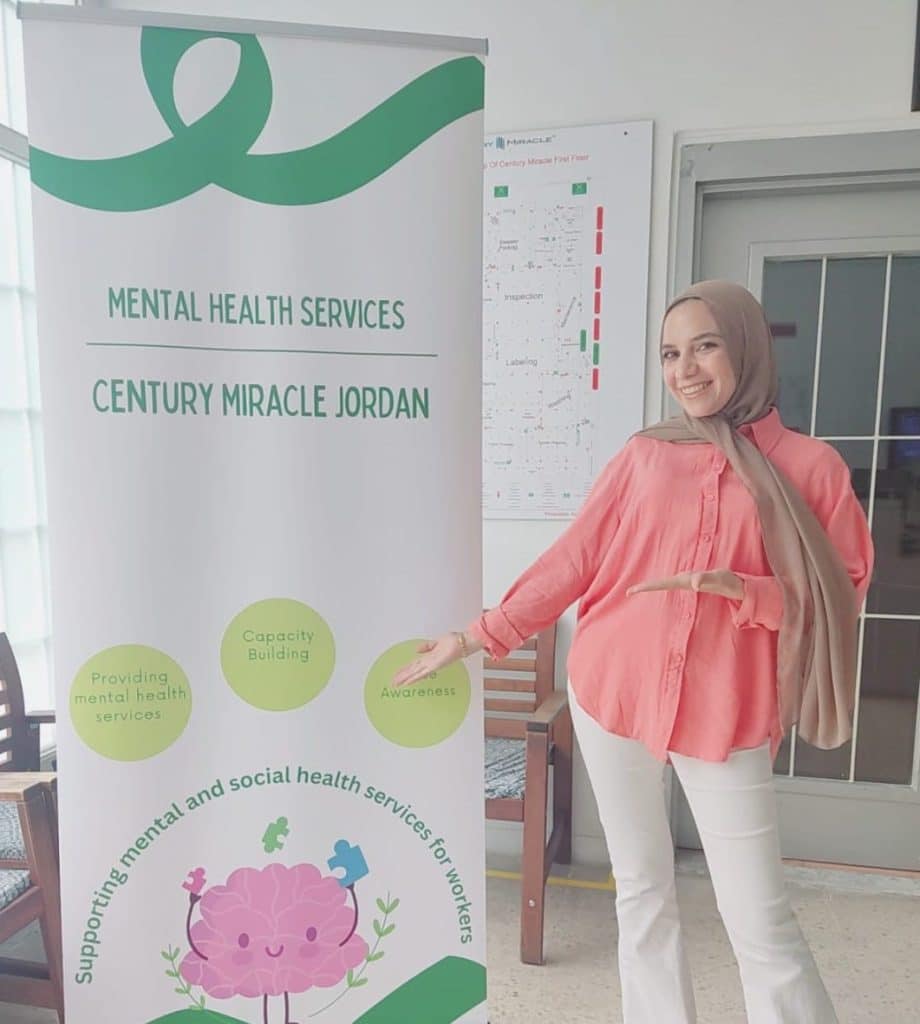AMMAN, Jordan, 26 April 2024— Sahar Rawashdeh, a psychologist offering counselling services to garment factory workers, aims to help remove the stigma that often surrounds mental health issues in Jordan.
A Yarmouk University graduate with a master’s degree in psychological counselling, Rawashdeh, 33, has been actively involved in psychological support for refugee children in remote villages, through several international organisations. She has also provided care services for older people.

Rawashdeh joined the garment factory, with help from the Princess Basma Centre for Human Development in Irbid, because it was one of the first in the country to establish a special mental health care unit for workers.
“I noticed a stigma among many workers, associated with the idea of resorting to a mental health specialist to solve their psychological problems. This stigma exists in all cultures, including the local culture in Jordan,” Rawashdeh said.
To counter these challenges, she collaborated with the human resources department, frequently visited by workers, to organise courses that focused on the causes behind different psychological issues.
“We developed an anger management programme to understand how to deal with work pressures, following specific steps based on understanding, listening, organising, and providing spaces for dialogue, and creating a comfortable and healthy work environment,” Rawashdeh added.
She observed multifaceted mental health care needs faced by migrant workers in adapting to their new lives in Jordan, and to work-related stress, especially in the initial stages of their employment.
Many workers with mental health issues would often resign, while others vented their psychological distress through self-harm, Rawashdeh noted. In response, she developed a work plan, in collaboration with management, to monitor the workers referred to her for counselling, and to ensure confidentiality.
Rawashdeh also organised several mental health awareness events to help address these challenges and the stigma linked to consulting mental health specialists.
“Allocating a day every year for mental health led us to develop a comprehensive awareness programme,” she said. “This included the distribution of educational brochures about mental health importance to all workers and across the factory, complemented by sports activities to bolster mental health.”
The awareness campaigns increased the number of cases referred to her, from one case a month, to as many as twelve.
“One of the cases I was following was of a female Bangladeshi worker suffering from depression. She encouraged a colleague struggling with stress to visit the mental health department. Awareness campaigns, follow-ups, and guidance have a major role,” Rawashdeh explained.
The impact of these initiatives extended to Jordanian workers, who gradually began to visit the health department regularly.
“Seeing the positive engagement of workers with the mental health department brings me joy; our efforts have been fruitful,” she said.
In 2021, the International Labour Organization’s (ILO) Better Work Jordan programme launched a Mental Health Project to help build the resilience of garment workers to mental health risks, including ensuring that factory-level support exists, and mental health referral systems are accessible to all workers. The project provided training and awareness sessions for garment factory workers across Jordan, focusing on equipping them with the necessary skills and knowledge for mental health care provision.
“The project offered important training, including on sexual and reproductive health awareness, and mental health first aid, as well as guidance on awareness and referral processes. It also supported us with activities and events to help improve workers’ mental health,” Rawashdeh said.
In Sahar Rawashdeh’s own words
Working in the mental health field is challenging, especially as we were pioneering mental health services in a diverse workplace. I recognised that the job required a deep understanding of the varied needs of workers from multiple nationalities.
In order to improve workers’ mental health and prevent mental health issues, I collaborated with management to develop mental health services.
My dedication and hard work are based on my belief in the necessity of providing both Jordanian and migrant garment workers with support services. Workers are affected by migration pressures, alongside family, financial, and physical health issues, as well as the nature of work itself.
We created a clear roadmap and dedicated the first 3-6 months to understand workers’ needs and challenges through mental health assessments and studies conducted by Better Work Jordan. There was a significant stigma associated with mental health issues among both Jordanian and migrant workers.
Moreover, there was a lack of awareness about mental health, as well as misinformation about mental health services and service providers in Jordan. The factory is home to workers from six different nationalities — Bangladesh, Burma, Sri Lanka, Nepal, Madagascar, and Jordan. This diversity brings unique challenges, especially during peak production seasons.
Our goals were specific: to improve workers’ mental health, safeguarding them from psychological distress; and to facilitate their access to mental health services. To achieve these objectives, I focused on capacity building through direct engagement and communication with workers to enhance their understanding of mental health issues. We organised training sessions, as well as activities like the celebration of World Mental Health Day. Management was supportive, providing the resources needed to develop a solid system for mental health services.
My dedication and hard work are based on my belief in the necessity of providing both Jordanian and migrant garment workers with support services. Workers are affected by migration pressures, alongside family, financial, and physical health issues, as well as the nature of work itself. Additional difficulties arise from the fact that women make up the majority of workers in the garment industry.
Recognising my commitment and the impact of my efforts, Better Work Jordan selected me to train other mental health liaison officers, enhancing their skills to support our workforce effectively. Continuous backing from senior management for the mental health counsellors has been instrumental.